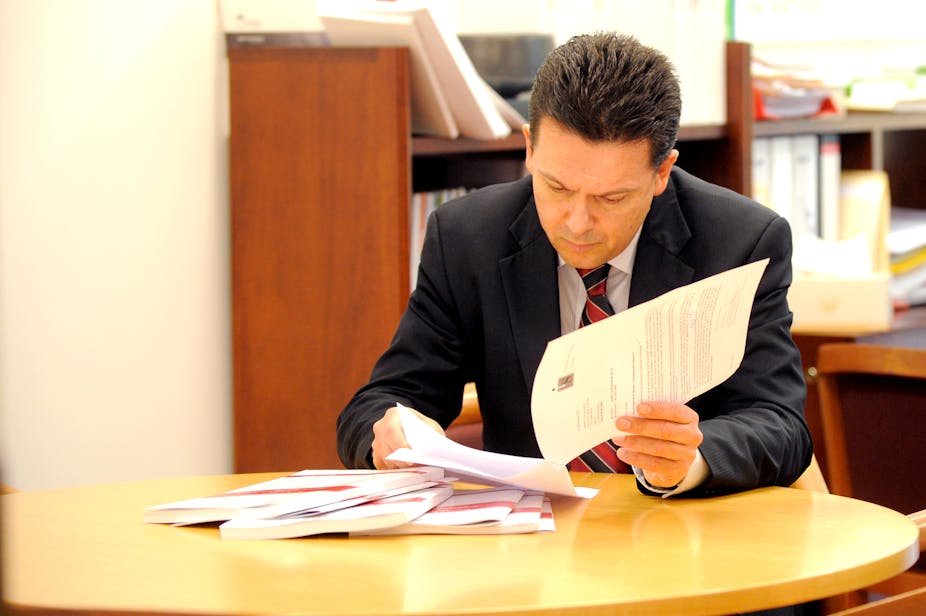Senator Nick Xenophon has caused controversy after claiming a South Australian priest is a sex offender.
Speaking in the Senate - and thus under the legal shield of parliamentary privilege - Xenophon revealed allegations that Monsignor Ian Dempsey raped Adelaide-based Anglican Archbishop John Hepworth in 1960 when Hepworth was 15.
Had Xenophon revealed the allegation outside of parliament, he and anyone who repeated it would have been vulnerable to defamation action but instead, news organisations are now permitted to repeat the untested allegations under the principle of qualified privilege.
The Conversation spoke to the Australian National University’s Professor John Uhr, Director of the Policy and Governance Program, about the importance of parliamentary privilege and its evolution in the Australian context.
Is what Xenophon did in any way against the convention of parliamentary privilege in Australia?
Australia is a big place and there are lots of practices so I don’t think there is a central or core convention. You’ll be able to find plenty of examples of people who have been timid in their use of parliamentary privilege and then you’d find a small number of controversial examples of people who have been bold.
This [naming] has been in the bold category, that’s for sure.
Can you give a bit of historical context on why parliamentary privilege exists and why Australia took up this element of Westminster practice?
It is historically the core immunity that elected members claim for themselves. Don’t think of it in terms of a perk of office, some sort of special attribute given to people in order to make life more desirable.
It is not that, it is more an immunity from prosecution on the basis of the need for frank and fearless speech by elected members particularly about powerful outsiders who might otherwise intimidate or cause elected members to be unduly cautious in the they contribute to affairs.
In theory you can see the undoubted value of having a special place where special people can speak up on behalf on public interests that would otherwise never be ventilated.
In practice, it is a case by case matter as to whether the individuals raising matters under parliamentary privilege are doing that with the best interests of their institution in mind. That is really the way to try and get a frame around this: to what extent has Senator Xenophon in the current case helped strengthen the capacity of the Federal Parliament to go about its business.
I think that is the kind of deep institutional story that we should be trying to focus on. There are examples in the recent past where other people in the Federal Parliament have been convinced that there are issues that need to be ventilated, that outsiders need to be held to account and from time to time those representatives have been forced to apologise because they have fired the gun too early.
They have been poorly advised and acted without proper responsibility and the result of that is to weaken the institutional capacity of parliament to use this kind of special reserve power to allow elected members, particularly elected members from non-governing parties to raise issues that they think are undoubtedly in the public interest.
For us the matter of lining up the cases where we think there has been a responsible use of parliamentary privilege along with those where in retrospect we can agree there has probably been irresponsible use.
This case [Xenophon] is yet to run its course. It is too early to tell but it will now form part of the archive of analysis we need to bring to bear on these cases.
Can you describe a situation where there’s consensus that parliamentary privilege wasn’t used well?
I think you can recall cases where a member of the judiciary had allegations about private conduct ventilated …
That would be Justice Kirby?
… That’s right. The allegations proved to be without foundation. That didn’t enfeeble the institution or the capacity for members of parliament to carry out their work but it certainly caused some kind of public uncertainty as to whether elected members from time to time simply shot their mouth off and contributed little to the public interest, in fact, probably misused the special responsibilities they have as elected members.
There are bound to be cases, probably one a decade or more going back to Federation, where the thing called parliamentary privilege becomes an object of public ridicule because of the matter of community opinion.
There may be a private grievance being aired without a lot of good information or solid evidence but that is apparently the price we are learning to pay in order to retain the institutional capacity when times demand it for elected members to carry out business in the spirit of proper responsibility.
I am being cautious because I’m not covered by parliamentary privilege.
Many of our parliamentary procedures appear dated and anachronistic. Is there argument that we should we reform parliamentary privilege?
This was one of the great reforms of the Hawke Labor governments of the 1980s. They are quite properly recognised for having introduced a number of socio-economic reforms, but they were equally committed to bringing in, on a statutory footing, the law of parliamentary privilege, not leaving exactly to the kind of conventional understanding you’ve described, not a cherry picking exercise where you pick bits of British history that you feel appropriate for the way you want to steer things today.
Instead, lay down the law of the land in such a way that everybody would have a better settled agreement as to the nature of parliamentary privilege so the Hawke Government deserves credit for that.
It coincided with the opening of the new parliament and quite properly, it acted as a kind of symbol for the new Parliament House when it opened for business. It is one of its signature bits of legislation.
* This article has been amended to clarify the allegations revealed by Senator Xenophon in parliament.

